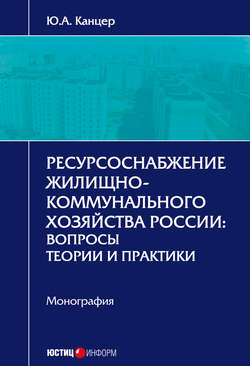Читать книгу Ресурсоснабжение жилищно-коммунального хозяйства России. Вопросы теории и практики - Ю. А. Канцер - Страница 1
ОглавлениеРецензент:
Кванина В.В. – доктор юридических наук, профессор, заведующая кафедрой предпринимательского, конкурентного и экологического права Южно-Уральского государственного университета (национальный исследовательский университет)
Вавилин Е.В. – проректор Саратовской государственной юридической академии, доктор юридических наук, профессор, судья ВАС РФ в отставке.
Ключевые слова: ресурсоснабжение, договор ресурсоснабжения, природа отношений, ресурс, управляющая компания, товарищество собственников жилья, ресурсоснабжающая организация, коммунальные услуги, гражданско-правовая ответственность, непосредственный способ управления.
Y.A. Kantser
RESOURCE SUPPLY OF HOUSING AND COMMUNAL SERVICES IN RUSSIA: THEORY AND PRACTICE
Monograph
Executive editor V.A. Vaypan
Reviewers:
Kvanina V.V. – Doctor of Law, Professor, Head of the Department of Business, competitive and Environmental Law of the South Ural State University (National Research University)
Vavilin E.V. – Vice-Rector of Saratov State Academy of Law, Doctor of Law, Professor, Judge of the Supreme Arbitration Court of the Russian Federation in retirement.
Kantser Y.A.
Resource supply of housing and communal services in Russia: theory and practice: monograph / YA. Kantser; executive editor V.A. Vaypan. – M.: Yustitsinform, 2017. – 196 p.
The monograph discloses the nature of relations in power supply through three main features: the essence of the «energy» («resource») concept; resource delivery with the associated network; the provision of utility services to the owners of residential premises as the final consumers. The study shows that the resource, along with the thing, is an independent object of civil rights; the concept of «resource» and «the power supply contract» with the definition of their attributes are described; the parties of the power supply contract are defined; the concept of «power supply» is derived; a lot of attention is paid to responsibility for violation of obligations. The author proposes a number of changes and additions to the existing legislation governing the power supply contract.
The monograph is intended for a wide readership – students, postgraduates, professors, representatives of scholarship and practice, as well as anyone interested in the problems of resource supply and housing maintenance and utilities board.
Key words: power supply, the power supply contract, the essence of relationship, resource, management company, homeowners, power supply organization, utilities, civil liability, direct way to manage
